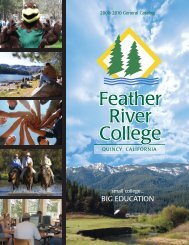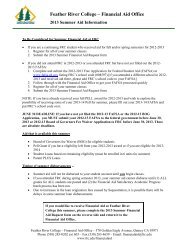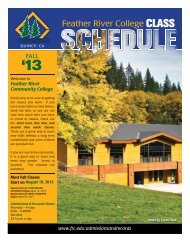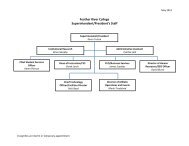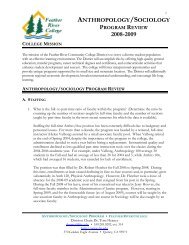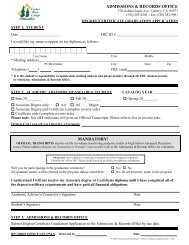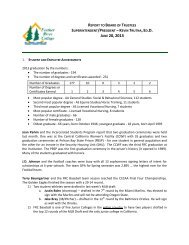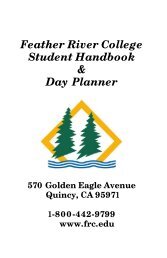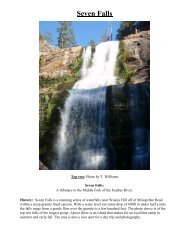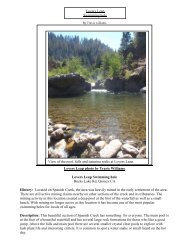2012 Catalog PDF - Feather River College
2012 Catalog PDF - Feather River College
2012 Catalog PDF - Feather River College
You also want an ePaper? Increase the reach of your titles
YUMPU automatically turns print PDFs into web optimized ePapers that Google loves.
Course Listings<br />
ENVR 201 INTRODUCTION TO GEOGRAPHIC 3 UNITS<br />
HOURS: 2 LEC; 3 LAB INFORMATION SYSTEMS (GIS) CSU<br />
An introduction to the principles and practices involving Geographical Information Systems (GIS). How GIS function<br />
in an interdisciplinary approach to data and sampling methods. Mapping, basic cartography, analysis, geographical<br />
information system design, concepts, and implementation. How various data types are used in modeling and<br />
cartographic output production.<br />
ENVR 210 INTRODUCTION TO SOIL SCIENCE 3 UNITS<br />
HOURS: 2 LEC; 3 LAB<br />
CSU<br />
An introduction to the biological, chemical and physical properties of soils. Major topic areas include the relationship<br />
of soil characteristics to land management, maintenance of soil productivity, soil erosion processes and erosion<br />
control methods, soil classification and the use of soil survey information in agriculture, watershed and wildlife<br />
applications. The relationship of soil properties and the geologic/geomorphic setting is emphasized. Cross-listed<br />
with AGPS210.<br />
ENVR 220 INTRODUCTION TO FORESTRY 3 UNITS<br />
HOURS: 2 LEC; 3 LAB<br />
CSU<br />
Comprehensive, broad overview of forest ecology/biology, silviculture, management, policy and career opportunities.<br />
Labs include field trips such as visits to a national forest, national park, private industrial forest, wilderness area,<br />
sawmill and the FRC campus forest. Cross-listed with FORS220.<br />
ENVR 240 INTRODUCTION TO WILDLIFE AND 3 UNITS<br />
HOURS: 2 LEC; 3 LAB FISHERIES: AN INTEGRATED APPROACH CSU<br />
An exploration of the field of wildlife biology, including conservation, ecology, threats, and management of wildlife<br />
resources. The class is designed as an introductory-level course for the student interested in wild vertebrate species,<br />
including fish. Cross-listed with WILD240.<br />
ENVR 241 WILDLIFE DIVERSITY AND FIELD 4 UNITS<br />
HOURS: 2 LEC; 6 LAB TECHNIQUES CSU<br />
An applied course dealing with field identification and basic natural history of vertebrate wildlife and the fundamental<br />
field techniques used in wildlife management. ENVR / WILD 240 is a prerequisite for this course. Cross-listed with<br />
WILD241.<br />
ENVR 250 FISH CULTURE 3 UNITS<br />
HOURS: 2 LEC; 3 LAB<br />
CSU<br />
An introduction to the techniques and methodology of fisheries culture, in earthen ponds and flow-through<br />
raceways. Lectures will focus on history, theory, hatchery systems, site selection, and water quality, feeding rates, and<br />
the economics of an aquaculture facility. The lab portion will focus on applying the lecture to the FRC fish hatchery<br />
and the production of salmonid species.<br />
ENVR 266 ADVANCED AQUACULTURE 3 UNITS<br />
HOURS: 2 LEC; 3 Lab<br />
CSU<br />
This course builds upon the knowledge gained in ENVR250 Fish Culture and delves deeper into the subjects of water<br />
quality, water management, feed management, inventory, and bio filtration. These subjects are the driving force for<br />
recirculation fish culture. Students will explore the important mechanical components of a system and the role each<br />
plays in the life support of the culture species. Cross-listed with AGAS 266. Prerequisite: ENVR 250.<br />
ENVR 280 ENVIRONMENTAL CAPSTONE 2 UNITS<br />
HOURS: 1 LEC; 3 LAB<br />
CSU<br />
This interdisciplinary class has two broad objectives: (1) to synthesize information gathered in courses required for<br />
the environmental studies major and develop written and oral reports aimed at conserving natural resources; and<br />
(2) to develop skills in seeking out, applying to, and interviewing for continued education and/or employment in<br />
environmental fields. Prerequisite: Completed 20 units of required core courses for the Environmental Studies or<br />
Environmental Science majors.<br />
164





